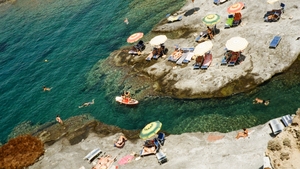
Ponza
Italy
A coastline of caves, grottos, and faraglioni embraces a land of soft summer rituals: swims in moon-shaped coves, sunset-drenched dinners, and moped rides through winding roads and pastel-painted houses.
Suspended between Naples and Rome in the archipelago that bears its name, Ponza—like all islands—is also suspended between goodbyes and a deep sense of permanency; longidely dreamed of all year by seafarers who are inevitably drawn back to its shores, it gracefully carries the legends of sirens and sorcerers, heartbroken princesses and future-predicting snakes. And a deep, luminous charm.
Editor: Ottavia Mapelli Curator: Agnese Violati Photographer: Greta Gallingani
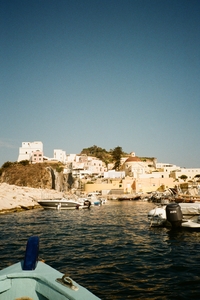
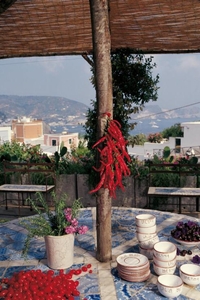
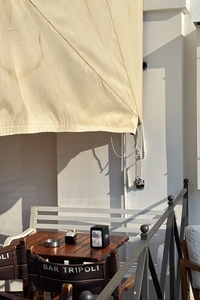
The Harbour
It all begins at the Bourbon harbour: as you approach by boat, the rows of moored vessels gently swaying in the water blend into a welcoming committee of 1970s-style houses, mostly tiny bars where those who arrived earlier are already soaking in the island’s bella vita. Painted in sunset-warmed tones—blue, bright red, cream and pink—they dot the steep volcanic cliffs of the island.
A few steps on the island are enough to understand: this is a place where life is truly savoured. Everything begins and ends here, in what is undoubtedly the heart of Ponza. From here, you can rent a boat to sail across the bright blue Tyrrhenian to nearby Palmarola or Zannone, or tour the coves and beaches accessible only by sea. Stop for a quick espresso at one of the lively cafés lining the harbour, or drop your bags at the hotel before heading out to explore.
If you’re staying overnight, we recommend Villa Laetitia—an elegant, art-filled residence with panoramic terraces and understated luxury—or Hotel Santa Domitilla, set among gardens and lemon trees with a spa and peaceful views.
If you’re curious to understand how the island’s energy is distilled into a bottle, head uphill to Cantine Migliaccio: this historic vineyard reveals how Ponza’s volcanic soil, sea breeze, and sharp sun work together with native varieties like Biancolella and Forastera to produce salty, mineral-rich wines—true expressions of the island itself.
The town center is a maze of climbing roads, colourful walls, local designer boutiques, bars, and restaurants. For aperitivo, the best spot remains Bar Tripoli—a classic, if only for the joy of sipping a cocktail with a view of the port while people-watching the islanders, skin bronzed after a day at sea. It’s also a great choice for a cozy after-dinner drink.
For dinner, Acquapazza is a Michelin-starred favourite, where husband and wife Gino Pesce (nomen omen) and Patrizia Ronca elevate the island’s culinary bounty. Expect calamari, cuttlefish, amberjack, sea bream, and shellfish paired with the salty, mineral white wines of the island—grapes grown in volcanic soil under the influence of aromatic sea breezes.
Alternatively, on the terrace of Piccolo Hotel Luisa, Gamberi e Capperi is another go-to for ultra-fresh seafood.
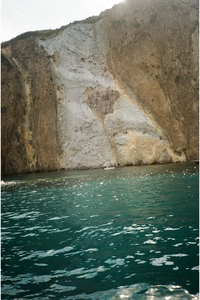
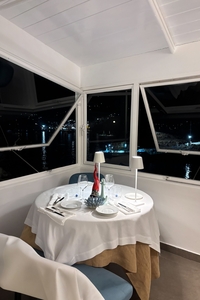
Le Cale (The Coves)
Each beach in Ponza tells a different story—most of them accessible only by sea, the same sea that brought Greeks, Romans, and Phoenicians to these shores.
Chiaia di Luna—named for its crescent moon shape—is the largest and one of the most beautiful beaches, with fine white sand and a Roman necropolis resting above it. It is unfortunately closed to the public, but you can admire it from a scenic overlook.
Frontone is the most popular and busiest beach—maybe it’s the pretty pebbled shore, the lively atmosphere of the beach club, or the Mediterranean scrubland backdrop. A walk along the rocks takes you to Enzo al Frontone, a local institution perched over the water where Enzo and his wife have been serving beloved island dishes for decades.
For a truly magical experience, book a table for dinner—you’ll be picked up by a small boat piloted by Enzo himself and taken to the restaurant. After a candle-lit pathway, you’ll dine with your feet in the sand under the stars.
Painted white and pink by nature, the Faraglioni of Lucia Rosa are only accessible by sea. They face the island of Palmarola and some of the island’s best sunsets. Their name comes from the legend of a local girl who, forbidden from marrying her true love, threw herself into the sea at this very spot. As we know, sad love stories make the most memorable legends.
Romantic Ponza continues with Cala Core, named for the heart-shaped formation carved into the rock surrounding it—supposedly the seat of emotions of a giantess queen who fell in love with Neptune. Even this story ends in heartbreak, but yours may end with a swim in the emerald-green waters of what locals call the Grotta dello Smeraldo.
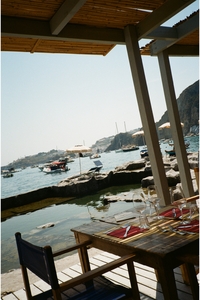
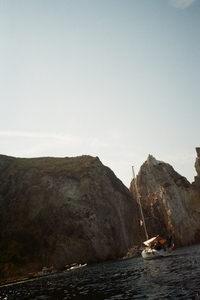
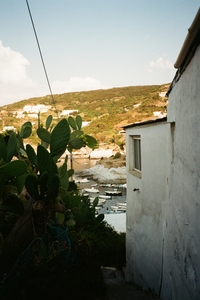
Cala Feola
One of our favourites on the island, Cala Feola is among the few sandy beaches on Ponza. Its glistening sea reflects white cliffs and lush Mediterranean vegetation covering the hills of Capo Bianco—a favourite among families.
When hunger starts to make itself felt, you’ll be spoilt for choice with some of the best restaurants on the island. Try La Marina for classic seaside dining with freshly caught fish, but don’t miss the parmigiana di pala di fico d’India—a delicate, sweet dish made from the tender pads of the prickly pear cactus.
Since 1984, Il Tramonto has promised “the most poetic sunset on the island” from one of Ponza’s best terraces, paired with dishes like squid, octopus with barley, and surprisingly great meatballs.
For pure island magic, walk past Cala Feola to the Natural Pools: here, the elements—lovers and sculptors of every island—have carved volcanic rock into two natural basins filled with bright blue water. Reach them on foot through a scenic trail, or by water taxi from the port. Earth or sea—you choose your element. One pool opens to the sea, while the other is nestled in the rocks.
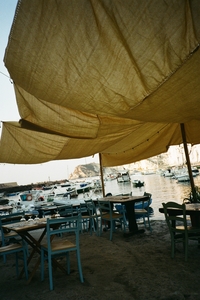
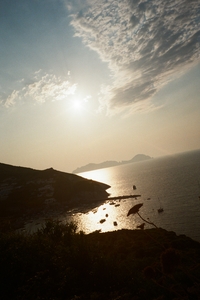
Palmarola
Palmarola owes its name to the palme nane—dwarf palms, the only native European species—which grow wild on this rugged island. Like its sister Ponza, it’s a place of dormant volcanoes, sea caves, crystal waters, and dormant obsidian quarries, once the main source of prehistoric tools and trade in the region.
It’s the wildest island in the archipelago—completely uninhabited except in the summer, when a few discerning travellers arrive for its raw, untouched beauty. Locals return too, to enjoy the shade of case grotta—ancient caves turned into summer homes.
One of Palmarola’s most spectacular wonders is Le Cattedrali—a natural cathedral of towering volcanic arches sculpted by wind and waves. Best admired from the water, this awe-inspiring geological formation is reason enough for a day trip.


